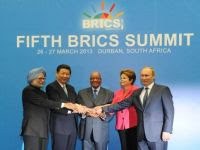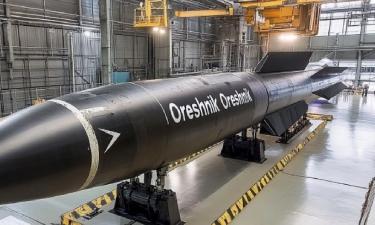The Russian - South African Strategic Partnership
Russia's relations with South Africa were not always as good as they are today. During Soviet times, the Soviet leadership disapproved strongly of the South African white regime's harsh apartheid politics. The Soviet Union supported the African National Congress in its struggle against apartheid. In 1956, the ties were severed completely by the USSR.

by Olivia Kroth
Diplomatic relations were taken up again in 1992. The South African President, Nelson Mandela, visited the Russian Federation in 1996, a landmark event in the relations of both countries. Another one followed in 2006, when Russia's President, Vladimir Putin, traveled to South Africa to sign the Treaty of Friendship and Cooperation between both nations.
This week, he flew to Durban for a second state visit and the 5th BRICS Summit. Before the regular meetings began, Vladimir Putin met with his South African colleague, Jacob Zuma, to renew the Treaty of Friendship and Cooperation of 2006. Some new clauses were added, as the mutual cooperation has been extended and intensified. The intergovernmental agreements pertain to the sectors of astrophysics research, culture, education, energy, ferroalloy production, fishery, flight safety, military, mining, solar energy and space research.
The Russian President is very satisfied with the outcome. He said at a press conference, "First of all, I would like to express my satisfaction with the course and results of our talks. This was my second visit to the Republic of South Africa. The Declaration on Strategic Partnership has just been signed. It sets forth long term benchmarks for bilateral coordination in trade, investment, the humanitarian sector and the international arena. Our nations have a good foundation for increasing cooperation." The figures look impressive, indeed. "In 2012, our turnover grew by a record 66.3 percent and reached nearly one billion USD. Russian companies attracted over one billion USD for mutually beneficial projects in South Africa and invested these funds into the South African economy," President Putin announced.
He is especially content with the excellent cooperation in the mining sector, "Cooperation in the mining sector is growing dynamically. In 2012, the Renova Group invested about 350 million USD into the development of manganese mines. Now they are working on a project for large scale modernization of a Ferroalloy plant with 250 million USD investments." But this is not all, Norilsk Nickel also did very well, "Another Russian company, Norilsk Nickel, invested some 100 million USD into the reconstruction of a copper-nickel plant, thus increasing its production capacity 2.5-fold," the Russian President elaborated.
South Africa, located at the southern tip of the continent, stretches with more than 2.500 kilometres of coastline along two oceans, the South Atlantic and the Indian Ocean. It is the 25th largest country of the globe and a world leader in mining. South Africa is rich in mineral resources. It owns the world's largest reserves of manganese and platinum group metals (PGM). In addition, the country possesses vast reserves of diamonds, gold, chromite ore and vanadium. South Africa's diamond industry is the 4th largest worldwide.
Russia will help South Africa to develop its nuclear power for peaceful purposes. Currently, the country possesses two nuclear reactors, generating five percent of its electricity. "Russia is offering South Africa help with the creation of advanced nuclear power industry, including the extraction of raw materials, the construction of NPPs and research reactors, design and domestic production of nuclear power equipment with Russian credit support," President Putin promised.
Intensified military cooperation is also in the works, but the signed document emphasizes that this is not aimed against any other state, nor is the aim to form a sort of military political alliance, seeking global domination. Russia supplies armoured vehicles and helicopters, combat aircraft and drones, anti-missile systems and other military equipment to South Africa. In 2013, a service centre for Mi-8, Mi-17, Mi-24 and Mi-25 helicopters will be installed in Johannesburg, South Africa. Russian specialists will assist local engineers and technicians in this service centre. In turn, South Africans will receive specialist training in the Russian Federation.
Cooperation in space research shall also receive a boost. The Russian Federal Space Agency Roscosmos and the South African Space Agency reached an agreement on astrophysical research in the RadioAstron project. RadioAstron is an orbital radio telescope, funded by the Astro Space Centre of Russia. It was launched from the Baikonur Cosmodrome in 2011, with a perigree of 10.000 kilometres and an apogee of 390.000 kilometres. RadioAstron is intended for radio-astrophysical observations with ultra-high resolution. It provides detailed images of the universe.
Furthermore, the Russian President pointed out that his country has reached new agreements with South Africa in the humanitarian sector, "Humanitarian cooperation represents a clear priority to Russia and South Africa, including educational exchanges and skilled labour training. We are set to increase the quota for accepting South African youth to Russian colleges."
The Russian President is fascinated by South Africa, its rich nature and interesting people. As a lover of wildlife, Vladimir Putin praised the South African fauna, "Here the fauna is very rich. There is a phrase in Africa - big five - five of the largest representatives of the animal world live in South Africa: the African elephant, leopard, lion, rhinoceros and the Cape buffalo." He went on to compare the big five to BRICS: Brazil, Russia, India, China and South Africa.
A total of 125 Russian delegates are participating in the 5th BRICS Summit in Durban, while 242 South African delegates are present, to share the lions' profits between Russia and South Africa.
Prepared for publication by:
Lisa Karpova
Pravda.Ru
Subscribe to Pravda.Ru Telegram channel, Facebook, RSS!



